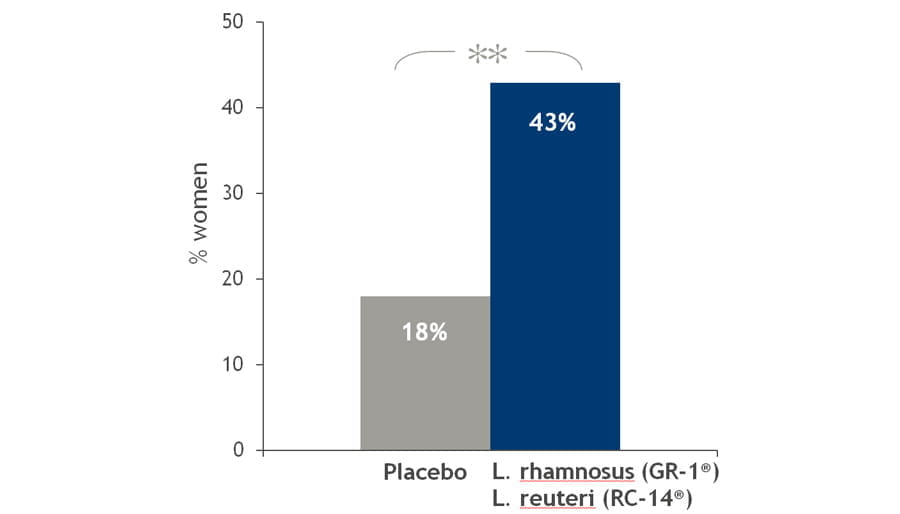Mar 17. 2017 14:13 GTM
Why should GBS be avoided?
GBS colonization is a common phenomenon1 in pregnant women and may cause an ascending intrauterine infection. At birth GBS may be transmitted to the baby which may cause serious infections like e.g. sepsis, pneumonia and meningitis. Antibiotics are therefore recommended for this specific target group.
Statistically significant effect
The randomized, double-blind and placebo-controlled study by Ho et al. 20162 showed that the combination of the two strains Lactobacillus rhamnosus (GR-1®) and Lactobacillus reuteri (RC-14®) - also known as Urex™ - resulted in a statistically significant increase in the number of pregnant women without GBS colonization at time of delivery. In total, 110 pregnant women diagnosed with GBS participated in the study, taking the probiotics from weeks 35-37 until delivery.
Fig. 1: Women without GBS colonization at time of delivery.
Good news for mother and baby
The new clinical data is good news for pregnant women who are GBS-positive and interested in natural ingredients to help support their urogenital wellbeing. Potentially, Lactobacillus rhamnosus (GR-1®) and Lactobacillus reuteri (RC-14®) may help reduce the need for antibiotic treatment during delivery and reduce the risk of GBS transmission to the baby - giving the baby a better start in life.
References
1Verani et al. 2010, MMWR Recomm Rep. 59(RR-10):1-36.
2Ho et al. 2016, Taiwanese J Obst Gynocol 55(4):515-518.
Chr. Hansen is a global, differentiated bioscience company that develops natural ingredient solutions for the food, nutritional, pharmaceutical and agricultural industries. At Chr. Hansen we are uniquely positioned to drive positive change through microbial solutions. We have worked for almost 150 years to enable sustainable agriculture, better food and healthier living for more people around the world. Our microbial and fermentation technology platforms, including our broad and relevant collection of around 50,000 microbial strains, have game-changing potential. Matching customer needs and global trends we continue to unlock the power of good bacteria to respond to global challenges such as food waste, global health and the overuse of antibiotics and pesticides. As one of the world’s most sustainable companies, we touch the lives of more than 1 billion people every day. Driven by our legacy of innovation and curiosity to pioneer science, our purpose – To grow a better world. Naturally. – is at the heart of everything we do.




